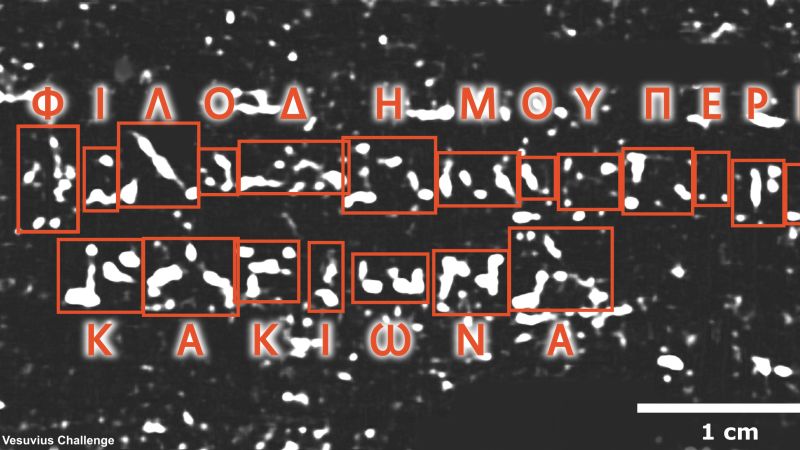Researchers have made significant strides in understanding the contents of a charred scroll that survived the catastrophic eruption of Mount Vesuvius nearly 2,000 years ago. This scroll, known as PHerc. 172, is pivotal because it links to Herculaneum, an ancient Roman town that was buried beneath volcanic debris in 79 AD. The scroll was part of a collection found in a villa, believed to have belonged to Julius Caesar’s father-in-law, located in present-day Italy. The Vesuvius Challenge, an initiative launched in 2023 aimed at deciphering texts from these scrolls without physically unrolling them, has made these findings possible.
The scrolls, which were discovered by a farmer in the 18th century, are delicate artifacts that suffered extensive carbonization during the eruption. They are fragile and difficult to handle, leading to various methods being attempted over the years to safely extract the text. Scholars have unsuccessfully employed weights, chemicals, and even gases in their attempts to unroll the scrolls, often resulting in further damage. In contrast, the team behind the Vesuvius Challenge has embraced innovative technologies to “virtually unroll” the scrolls, enabling a clearer examination of the text without compromising the physical integrity of these historical treasures.
Recently, two graduate students, Marcel Roth and Micha Nowak, from the University of Würzburg in Germany, alongside researcher Sean Johnson, independently identified the title and author of PHerc. 172 as “On Vices,” written by the Greek philosopher Philodemus. Their findings were rigorously reviewed by papyrology experts associated with the Vesuvius Challenge, affirming the accuracy of their discoveries. Philodemus is known for his Epicurean philosophies, which emphasize the pursuit of pleasure as central to a fulfilling life.
This particular scroll is believed to contain a portion of Philodemus’ larger ethical treatise titled “On Vices and Their Opposite Virtues and In Whom They Are and About What.” The text may represent the initial book in the series, although there remains uncertainty regarding its specific numerical designation. The Bodleian Libraries at Oxford University have noted that while the scroll could theoretically be marked as the first book by the letter alpha, it is also possible that it bears a different number indicating its place in the series.
Traditionally, researchers had assumed that the opening book of “On Vices” was a text titled “On Flattery.” However, the contents of PHerc. 172 do not correspond with this assumption, complicating the understanding of Philodemus’ works. The discovery of the scroll can potentially reshape scholarly views on the sequence and content of Philodemus’ writings.
Michael McOsker, a notable papyrology researcher at University College London, described the recent discovery as “a very exciting development.” He pointed out that this scroll provides a unique opportunity to deepen our understanding of Philodemus’ ethical perspectives. Other known texts from the “On Vices” series already exist due to previously unrolled papyri, including “On Property Management” and “On Arrogance.” Each of these highlights opposing virtues to various vices, contributing to an enriched understanding of moral philosophy from the Epicurean viewpoint.
The significance of this find cannot be understated, as it marks the first instance where a scroll’s title has been successfully read. This accomplishment has broad implications for the ongoing discovery and analysis of ancient texts. For instance, in October 2023, researchers achieved a milestone by decoding the first complete word from one of the unopened papyri, yielding the Greek term “πορφυρας” (porphyras), which translates to “purple.” Furthermore, in February, specific text columns from PHerc. 172 revealed the word “διατροπή” (diatropeace), meaning “disgust,” appearing within the scroll’s content.
Collectively, these discoveries not only illuminate individual elements of Philodemus’ philosophy but also invigorate the field of papyrology, offering new avenues for research and exploration into lost knowledge from antiquity. The pressing challenge remains to uncover more treasures hidden within the charred remains of Herculaneum’s scrolls.



